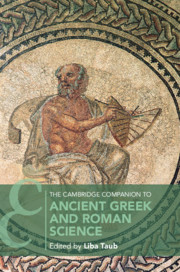Book contents
- The Cambridge Companion to Ancient Greek and Roman Science
- Other Volumes in the Series of Cambridge Companions
- The Cambridge Companion to Ancient Greek and Roman Science
- Copyright page
- Contents
- Contributors
- Acknowledgements
- Introduction
- 1 Presocratic Natural Philosophy
- 2 Reason, Experience, and Art: The Gorgias and On Ancient Medicine
- 3 Towards a Science of Life: The Cosmological Method, Teleology, and Living Things
- 4 Aristotle on the Matter for Birth, Life, and the Elements
- 5 From Craft to Nature: The Emergence of Natural Teleology
- 6 Creationism in Antiquity
- 7 What’s a Plant?
- 8 Meteorology
- 9 Ancient Greek Mathematics
- 10 Astronomy in Its Contexts
- 11 Ancient Greek Mechanics and the Mechanical Hypothesis
- 12 Measuring Musical Beauty: Instruments, Reason, and Perception in Ancient Harmonics
- 13 Ancient Greek Historiography of Science
- Bibliography
- Index Locorum
- General Index
- Other Volumes in the Series of Cambridge Companions (continued from page ii)
4 - Aristotle on the Matter for Birth, Life, and the Elements
Published online by Cambridge University Press: 17 January 2020
- The Cambridge Companion to Ancient Greek and Roman Science
- Other Volumes in the Series of Cambridge Companions
- The Cambridge Companion to Ancient Greek and Roman Science
- Copyright page
- Contents
- Contributors
- Acknowledgements
- Introduction
- 1 Presocratic Natural Philosophy
- 2 Reason, Experience, and Art: The Gorgias and On Ancient Medicine
- 3 Towards a Science of Life: The Cosmological Method, Teleology, and Living Things
- 4 Aristotle on the Matter for Birth, Life, and the Elements
- 5 From Craft to Nature: The Emergence of Natural Teleology
- 6 Creationism in Antiquity
- 7 What’s a Plant?
- 8 Meteorology
- 9 Ancient Greek Mathematics
- 10 Astronomy in Its Contexts
- 11 Ancient Greek Mechanics and the Mechanical Hypothesis
- 12 Measuring Musical Beauty: Instruments, Reason, and Perception in Ancient Harmonics
- 13 Ancient Greek Historiography of Science
- Bibliography
- Index Locorum
- General Index
- Other Volumes in the Series of Cambridge Companions (continued from page ii)
Summary
One of Aristotle’s major contributions to natural science was his development of an idea that he called hulê’, which we translate into English as ‘matter’. The notion of matter seems quite ordinary to us today, but Aristotle’s idea was new at the time. The word hulê’ originally meant forest, brushwood, or cut wood and, aside from a single occurrence in Plato’s Philebus (54c), Aristotle is the first (extant) author to use the term in a general account of things in the natural world. Our notion of matter is a descendant of his, but we should be careful not to assume that he thought of it the way we do today.
- Type
- Chapter
- Information
- The Cambridge Companion to Ancient Greek and Roman Science , pp. 79 - 101Publisher: Cambridge University PressPrint publication year: 2020
- 2
- Cited by

